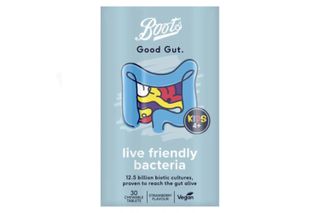16 natural cold remedies suitable for all the family: Expert-approved tips for navigating sniffle season
These natural cold remedies will help to keep the whole family feeling fresh through the winter


It's that time of year again, but these natural cold remedies will ease your discomfort and help you manage the unpleasant symptoms of winter illnesses.
Just like there are plenty of natural cough remedies, natural flu remedies and sore throat remedies out there, you can cure a cold from the comfort of your own home too. As well as lots of rest and drinking plenty of fluids, these natural cold remedies are a great defence against germs - perfect for those with young kids who are too young to take cold and flu medication and are always picking up bugs from school.
Claire Barnes, nutritional therapist for gut health brand Bio-Kult, recommends adapting the food you eat as the first port of call when you or someone in your family develops a cold. ‘Warming fragrant spices such as ginger, turmeric and cinnamon help to improve circulation and aid digestion. By increasing your circulation, you could be helping your body to speed up its recovery,’ she says.
It’s also time to turn your heating down – however counter-productive this seems. ‘Central heating and air heaters in cars upset the balance of the nasal microbiome and make it more susceptible to harbouring viruses and harmful bacteria,’ explains Claire. To avoid this, take a walk in the fresh air daily if possible, and opt for an extra jumper or a blanket on your bed before you crank the heating up.
With this advice in mind, we've spoken to Claire along with several other experts to put together a list of the best natural cold remedies - and there's something for every member of the family.
16 natural cold remedies
From taking turmeric to sipping cranberry juice, there are some wonderful foods and natural supplements that can strengthen your immune system or ease your symptoms without relying on a pharmacy.
There are practical steps you can take too, from essential oil-infused steam inhalation – which can clear nasal passages without you needing to take decongestants (and it feels a bit like a spa treatment too) – to gargling with salt water. Read on for 16 natural cold remedies that will help to make you feel better and put you on the path to recovery.
GoodtoKnow Newsletter
Parenting advice, hot topics, best buys and family finance tips delivered straight to your inbox.
1. Berries
Fruit consumption generally drops in winter, when really we should be increasing it, says Claire. While berries may not be as tempting as a warming sticky toffee pudding with custard, the antioxidants and vitamin C in them help ward off colds and flu.
Elderberries, in particular, exhibit anti-flu activity, according to a study in the Journal of Functional Foods, while blueberries – which are rich in flavonoids – can significantly reduce the risk of catching colds and coughs, according to research undertaken by The University of Auckland.
Claire recommends ‘a handful of berries every day through the winter months, while also keeping some natural high-strength berry syrup [such as Boots Immune Defence Black Elderberry Syrup, £9.30] in the fridge. This will help to coat an inflamed throat while also providing high levels of vitamin C and antioxidants.’
Bear in mind that you will need to check the age suitability of berry syrup, and that the suggested dosage will differ depending on the age of your child.

2. Chicken soup
There’s a reason why, when you were younger, you were given chicken soup when you had a cold, says women’s naturopathic nutrition coach Jessica Shand.
‘Chicken soup is brimming with vitamins and incredible nutrients to help support the immune system when it’s fighting cold and flu symptoms,’ she says. ‘The warming element to the soup is not only lovely and comforting when you’re not feeling your best, but it also helps to soothe the throat and may help clear nasal congestion.’
Research backs this theory up. According to a study that featured in Chest, the peer-reviewed journal of the American College of Chest Physicians, "chicken soup may contain a number of substances with beneficial medicinal activity including an anti-inflammatory mechanism that could ease the symptoms of upper respiratory tract infections."
If you've got kids suffering with a cold, why not try family chef Annabel Karmel's Thai chicken soup recipe.
3. Cranberry juice
Known for being a helpful home remedy to combat cystitis, cranberry juice may also help treat the common cold. This is partly due to the fact that cranberries are rich in polyphenols, which one study published in the Nutrition Journal found reduced the number of cold or flu symptoms participants experienced.
There are other reasons, too. ‘Cranberries are rich in antioxidants, including vitamin C, which helps to support the immune system,’ says Dr Roger Henderson, a GP and expert for Olbas.
‘Cranberry juice also includes flavonoids, which have anti-inflammatory effects, so it’s a good juice to drink when you need a boost to help fight off a cold,’ adds Jessica. However, she warns of drinking too much as it can be high in sugar. Instead, buy low-sugar options that are at least 25% concentrate and aim for 250ml of this twice a day.
It's also worth noting that the NHS says if you are giving fruit juice to a baby under 12 months old, dilute it to one part juice and 10 parts water, and limit it to meal times. From 5 years old, you can give your child undiluted fruit juice, but stick to no more than one glass a day. Following these guidelines will limit tooth decay.
4. Spices
There's an array of spices that can be used as natural cold remedies, because they are able to clear congestion - if you can tolerate the heat! 'Although spices used in cooking can help break down mucus build-up and clear sinus passages, just like every ingredient on this list it won't cure cold and flu,' says Jessica. But if you need some short-term relief, she advises: ‘Use fresh chillies (de-seed them though, unless you want the extra heat) and dried spices like cumin, paprika and turmeric,’ she says.
Jessica also suggests eating fresh or dried ginger and garlic. ‘Raw garlic is quite literally packed with antioxidants and its antimicrobial properties support the immune system,’ she says. ‘And ginger is one of the very best natural ingredients you should turn to when you have a cold – thanks to its active compounds.’
Turmeric contains curcumin, which can also be beneficial, adds Healthspan’s Medical Director Dr Sarah Brewer. ‘This compound is the equivalent of a smart drug as, instead of targeting one particular health problem, it has beneficial effects in different settings, including suppressing infections and helping to resolve excess inflammation. This may help the symptoms of a cold resolve more quickly,’ she explains.
A word of caution, however. Dr Henderson warns about going overboard, especially if you’re not used to eating them. ‘As spicy foods can cause nausea and stomach pain, be cautious of consuming while under the weather,' he says.
5. Echinacea
Echinacea is one of the most effective natural remedies for treating a cold and is especially useful in combating respiratory tract infections (RTI).
Dr Dick Middleton, pharmacist and previous chair of the British Herbal Medicine Association, explains why: ‘The clinical evidence showing that the herb Echinacea purpurea modulates the immune system in children, adults and the elderly is impressive. A growing body of research shows that the herb echinacea helps reduce the risk of catching an RTI, can reduce the severity of symptoms, and significantly reduces complications of RTIs such as sinusitis, bronchitis and pneumonia.’
Other research has also yielded positive results. ‘In 2012, 755 participants took part in the longest and largest trial thus far by the Common Cold Centre in Cardiff on the preventative use of echinacea over a four month period,’ says Dr Ross Walton, immunologist and founder of clinical research company A-IR.
Dr Walton continues: ‘The development of recurrent colds reduced by 59%, as well as the severity of cold symptoms. The need to use painkillers also fell by over half.’
Echinacea products are generally deemed unsuitable for children under 12 years of age, so for young children you might want to try an alternative remedy.
6. Essential oils and steam inhalation
Many natural cold remedies focus on plant-based essential oils such as eucalyptus oil and tea tree oil. You can add a few drops to a tissue and inhale the fumes (avoid skin or eye contact) or – better still – use these oils in tandem with steam inhalation.
Eucalyptus in particular has antibacterial, antiviral and decongestant properties, while ‘tea tree oil works as a natural antiseptic and antiviral to help kill the bacteria in the sinus passage,’ says Claire.
Meanwhile, ‘Inhaling steam to ease cold symptoms is a traditional method that’s been used for many years,’ says Dr Tim Bond, natural health expert from Puressentiel. ‘The steam from the water helps to open nasal passages, relieving the symptoms caused by inflamed blood vessels and helps with congestion by loosening mucus in the airways,’ he explains.
For a quick fix while you’re on the move, Dr Henderson suggests Olbas Nasal Spray. It contains eucalyptus, niaouli and wild mint extract with mineral-rich seawater to unblock your nasal passages within minutes. Plus, it's suitable for children over 6 years of age.

7. Gargling with salt water
It may not sound appealing, but gargling with salt water can really help with the severity of cold symptoms. Mike Wakeman, clinical pharmacist and scientific advisor to Schwabe Pharma, explains: ‘Gargling with salt water is a natural, low-cost way to ease discomfort,’ he says. 'Taken before bedtime, it may help prevent a common cold infection from getting worse.’
In addition, gargling with salt water can ease the pain from a sore throat that comes with a cold. ‘A saline solution can draw excess fluid from inflamed tissues in the throat, making it hurt less. Gargling also loosens thick mucus, which can remove irritants like allergens, bacteria, and fungi from the throat,’ says Mike.
Here, Mike explains how to try a saltwater gargle:
- Mix 1/4 – 1/2 tsp salt into 250ml warm water.
- Once the salt has dissolved, gargle the mixture in the back of your throat for as long as you can tolerate it.
- Swill the salt water around your mouth before spitting it out.
If you really dislike the taste. add a teaspoon of honey to make the rinse more palatable.
However, this remedy should be avoided for very young children, as too much salt can be dangerous. Be aware, the NHS recommends salt levels of less than 1g for 0-12 months old and up to 6g for those aged 11.
8. Ginseng
A particularly effective natural option for fighting a cold is the root of the Panax plant family, aka ginseng. Taken either in supplement form or consumed as a tea, it’s been linked to numerous health benefits including strengthening the immune system.
Dr Brewer explains: ‘Ginseng stimulates the activity of white blood cells against viral and bacterial infections. One study found that taking American ginseng extracts halved the risk of catching a cold during the four month study period compared with those taking an inactive placebo. When a cold did develop, the severity of symptoms was reduced in those taking ginseng extracts,’ she explains.
Other studies showed promising results, too. ‘The results of five trials involving 747 people found that American ginseng significantly reduced the total number of common colds by 25% compared to placebo and, compared to placebo, ginseng significantly shortened the duration of colds by an extraordinary 6.2 days!’ Dr Brewer adds. The study recommends taking ginseng as a preventative for 8-16 weeks to reap the benefits.
Bear in mind that it is widely recommended to avoid giving ginseng to babies and young children, and that pregnant people should also avoid the plant.
9. Honey and lemon
One of the most well-known and popular natural cold remedies, honey and lemon is a tried and tested combo for helping to clear congestion. ‘Honey has antibacterial properties, which helps to fight infection. It also has a demulcent effect: relieving irritation by forming a cooling film around the throat,’ says Dr Henderson. A squeeze of fresh lemon will further boost the natural power of a warm honey drink. ‘Lemon is packed with vitamin C, which the immune system needs, and contains antibacterial and antiviral properties to help fight infection,’ he adds.
Indeed, in 2018, guidance from the National Institute for Health and Care Excellence (NICE) and Public Health England (PHE) revealed that honey and over-the-counter remedies should be the first port of call for treating coughs over antibiotics. The study revealed that ‘honey and cough medicines containing pelargonium, guaifenesin or dextromethorphan have some evidence of benefit for the relief of cough symptoms.'
To try this remedy, mix a spoonful of honey and a good squeeze of lemon juice with hot water and drink the mixture. That said, this remedy is not one to try with younger children, as hot water could burn their more sensitive skin. And, honey should never be given to babies under one year old.
10. Green tea
Sipping on warm drinks can help rehydrate lost fluids, but certain drinks are better than others at treating a cold. Take green tea, for example. 'Since the late 1990s, several epidemiological studies have suggested that the regular consumption of green tea decreases influenza infection rates and some cold symptoms,' states research published in the Molecules journal.
‘Rich in antioxidants, green tea is beneficial to drink when you’re suffering with a cold,’ says Jessica. 'And it has antiviral properties, so whilst it won’t cure you, it’s a great drink to help improve symptoms and provide your body with the extra goodness.’
‘Green tea can also help to soothe the inflammation and irritation that can cause a sore throat,’ adds Dr Henderson.
Note that herbal teas shouldn't be given to children under two - and even then, should be avoided if they contain caffeine.
11. Probiotics
The benefits of probiotics are primarily linked to digestion. However, live bacteria supplements can also boost our immune system. ‘Taken over the winter months, probiotics have been shown to significantly shorten common colds and reduce the severity of symptoms,’ says Claire.
Opt for a multi-strain product as it provides more positive benefits. Claire recommends Bio-Kult Boosted, but you can get probiotics for kids too, such as Boots' Good Gut Live Friendly Bacteria (suitable for ages 4+).

12. Sleep
One of the best natural cold remedies is sleep. We tend to go about our daily tasks when we are ill when, in truth, some decent shut-eye is key to our recovery. In fact, getting enough sleep can even prevent a cold from developing.
‘Ensuring you get sufficient sleep is an important factor in helping to prevent and fight colds. This is when the body is working at its hardest to fight infection,’ says Kristoffer Ahlerup, commercial director of Enzymatica. He adds: ‘Research has shown that a lack of sleep can affect the immune system and its ability to fight infection. ‘
And Dr Bond agrees, explaining, 'During sleep, the body both produces and releases cytokines – a type of protein that fights infection and inflammation contributing to an immune response – and skimping on sleep makes the body produce fewer cytokines.'
13. Sleeping with an extra pillow
And speaking of sleep, this simple trick can make a world of difference as to how much shut eye you get at night while you're sick.
‘People often complain that they can’t get a good night’s sleep when they have a cold. Sinus issues such as a runny or stuffy nose, or a sore throat, can affect our sleep,' says Dr Bond. 'People find it hard to breathe or feel like the mucus gathers when lying down. This causes them to cough more or clear their airways.'
He recommends propping your head up slightly with an extra pillow. 'This can ease sinus problems and help our breathing, allowing us to get some good, restful sleep,' he says.
Avoid using too many pillows though. ‘This could lead to neck pain and discomfort. Just two standard pillows should elevate your head enough.’
14. Vitamin D
We source vitamin D through sunlight and certain foods such as oily fish, red meat and egg yolks. This wonder vitamin is (amongst other benefits) strongly linked to reducing the severity of colds.
‘During Victorian times, respiratory infections were treated with cod liver oil and exposure to UV-rich sunlight. Both of these are now known to boost blood levels of vitamin D,’ says Dr Brewer. While previous generations had to use guesswork, modern science proves that vitamin D has a huge influence on our wellbeing.
‘Researchers have found that taking a vitamin D3 supplement can reduce the risk of experiencing a respiratory tract infection – including the common cold, flu and pneumonia – by a third compared with placebo,’ says Dr Brewer. She adds that the benefits ‘are even greater in people with an existing vitamin D deficiency.’
15. Warm or cold compress
As well as relaxing sore muscles and reducing swelling, a warm compress on the sinuses can ease cold symptoms. ‘Popping a hot (not too hot!) towel over your upper face can feel soothing,’ says Kristoffer. Not only that, a compress ‘will dilate the nasal passages, giving you a little respite from the congestion and allowing you to drift off,' he says.
Mike recommends alternating hot and cold packs on your eyes and sinuses. 'This helps warm the nasal passages and loosen mucus secretions,’ he says. ‘Start by placing a hot towel or face flannel across your sinuses for about three minutes. Then place a cold compress across your sinuses for 30 seconds. For best results alternate three more times. Repeat the treatment about four times a day.’
16. Zinc lozenges
Food sources of zinc include red meat, seafood (especially oysters), offal, brewer’s yeast, wholegrains, pulses, eggs and cheese. However, food processing removes much of the zinc present – especially in grains, says Dr Brewer.
Instead, Dr Brewer recommends zinc lozenges – and for good reason. ‘Clinical trials show that sucking zinc acetate lozenges significantly reduces symptoms of the common cold compared with placebo,’ she explains, as well as shortening the duration of:
- Nasal congestion by 37%
- Scratchy throat by 33%
- Hoarseness by 43%
- Cough by 46%
How to stop a cold from spreading
To stop a cold from spreading, you need to first reduce the spread of the germs from coughs and sneezes. As most parents will know, once your child develops the first sign of a cold it's all hands on deck to try and prevent the illness from taking the whole family out.
To do this, the NHS recommends:
- Wash your hands often with warm water and soap
- Use tissues to trap germs when you cough or sneeze
- Bin used tissues as quickly as possible
- Avoid touching your eyes and nose
- Avoid sharing household items such as blankets, towels and cups
This applies to both the person with the cold and those who are hoping to avoid catching it. Remember that those with a cold are infectious until all their symptoms are gone - usually for one to two weeks.
Looking for more natural remedies? We've spoken to the experts to find out how to get rid of a headache, as well as the best natural cold remedies. You might be interested in these natural anxiety remedies too.

Debra Waters is an experienced online editor and parenting writer. She also has a strong background on health, wellbeing, beauty, and food. She currently writes for Goodto and Woman&Home, and print publications Woman, Woman’s Own, and Woman’s Weekly. Debra has written for What to Expect, Everyday Health, and Time Out. In addition, she has had articles published in The Telegraph and The Big Issue.
-
 How to play with Barbie dolls: 6 ways to use the iconic doll as a positive role model at home
How to play with Barbie dolls: 6 ways to use the iconic doll as a positive role model at homeIf you have a little one who loves to play with Barbie, there are lots of positive ways in which you can encourage them to play in a way that helps their development and self-esteem. We’ll show you how.
By Joanne Lewsley Published
-
 Think you're raising a mini-me? It's actually unlikely your child will inherit your personality and could have a temperament closer to a 'random stranger', according to new study
Think you're raising a mini-me? It's actually unlikely your child will inherit your personality and could have a temperament closer to a 'random stranger', according to new studyIf you often hear the phrase 'like mother like daughter,' or 'like father like son,' research suggests you're actually only slightly more likely to share familial traits than with strangers.
By Lucy Wigley Published